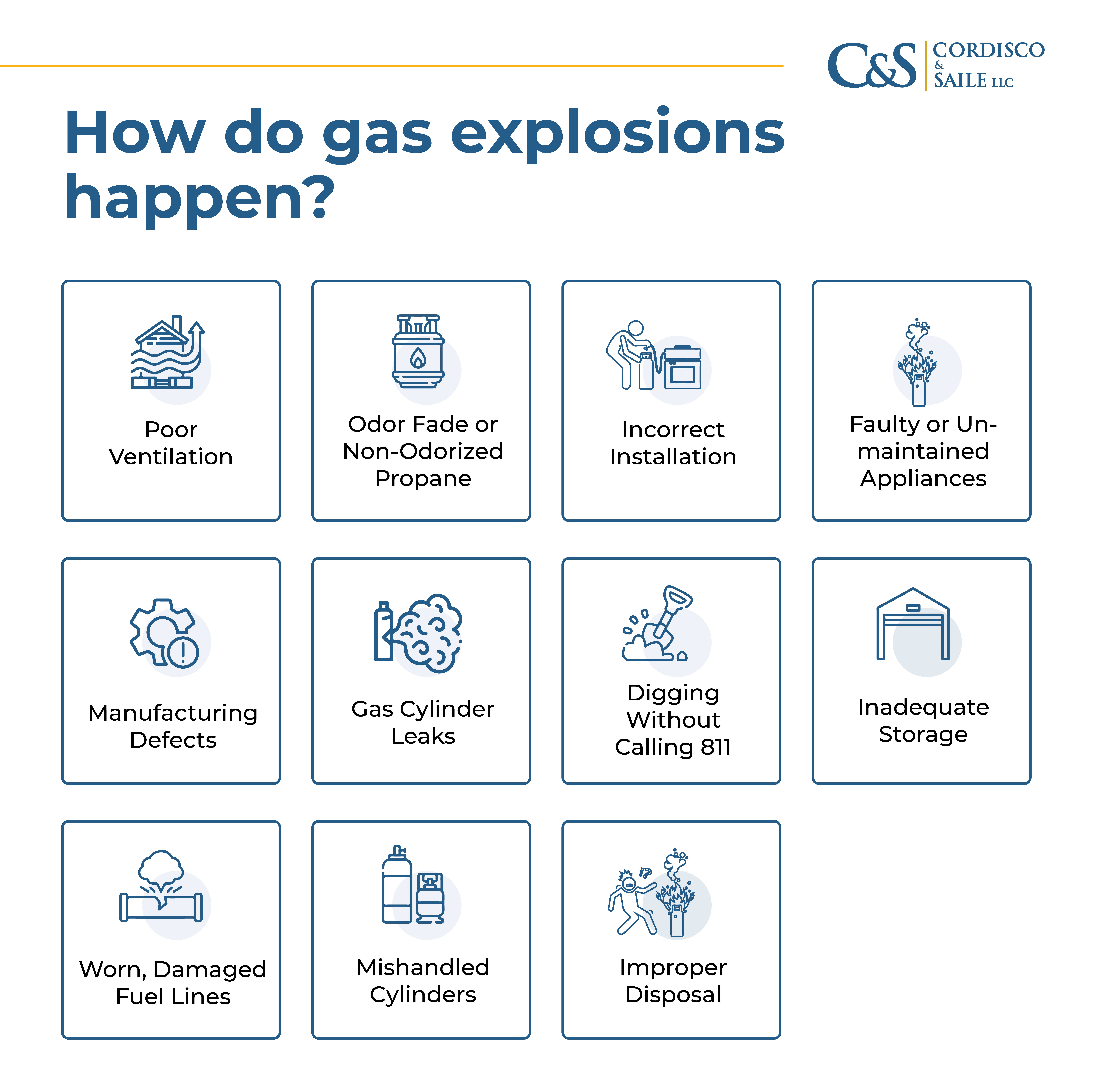
What causes gas explosions in houses? Nearly always, the culprit is an undetected gas leak caused by aging appliances, an inappropriately stored propane tank, improper installation, damaged fuel lines, or manufacturing defects.
You may be entitled to financial compensation if you have been harmed by a gas explosion caused by another party’s negligence or a defective product. The Pennsylvania personal injury attorneys at Cordisco & Saile LLC will fight for your rights and pursue the compensation you deserve.
Key Takeaways
- Gas explosions in houses are often triggered by gas leaks resulting from incorrectly installed or faulty appliances, damaged fuel lines, mishandled cylinders, and improper propane disposal or storage.
- Key steps to take after an explosion include prioritizing your safety, contacting the authorities, documenting the damage, and seeking legal representation.
- If propane or natural gas combustion has damaged your home or injured you or your family, another party may be liable.
- An experienced Pennsylvania gas explosion lawyer can help you seek compensation for pain, suffering, property damage, and loss of a loved one from a wrongful death.

Causes of Gas Explosions
Gas explosions typically result from leaking propane, natural gas, or carbon monoxide. As fumes escape, the air-to-fuel ratio climbs until it reaches a deadly threshold where combustion is possible—for propane, that proportion is 15.5:1. At this saturation level, a destructive explosion can occur without warning.
How do gas explosions happen? The primary catalysts for gas leaks include the following:
Poor Ventilation
In many cases, the answer is poor ventilation. Both leaks and appliance usage in enclosed spaces may lead to severe consequences. As carbon monoxide builds up, the risk of an explosion dramatically increases.
Odor Fade or Non-Odorized Propane
As a colorless and odorless gas, propane has the potential to become a silent killer. To prevent this, manufacturers add an odorant—ethyl mercaptan—to give liquid petroleum its distinctive rotten-egg smell.
When a tank sits unused, its lining may neutralize the ethyl mercaptan, rendering the fuel undetectable during a leak. In other instances, the gas company may have failed to properly odorize propane to federal standards, leading to an explosion.
Incorrect Installation
What causes gas explosions in houses? Improperly installed fuel lines and propane tanks are common causes. The National Fire Protection Association and the Occupational Safety and Health Administration have outlined stringent liquid petroleum tank placement standards. For example, installers must position tanks at least 15 feet from electrical equipment and meters, eight feet from high-voltage power lines, and 30 feet from your home.
Faulty or Unmaintained Appliances
Gas-powered appliances are common in homes throughout Pennsylvania. These water heaters, stoves, furnaces, ovens, and boilers pose a unique risk to homeowners. Years of wear and tear can expose your fuel lines, increasing the probability of a leak—a risk that worsens if you don’t properly maintain household machinery.
In other cases, cheaply made appliances may contain hard-to-detect internal leaks.
Manufacturing Defects
In some cases, manufacturers are to blame for home gas explosions. In 2023 alone, the U.S. Consumer Product Safety Commission issued recalls for portable generators, outdoor kitchens, and fire tables. All exhibited dangerous defects associated with fuel leaks.
The product liability lawyers at Cordisco & Saile LLC can determine whether a faulty device or component caused your family’s tragedy.
Gas Cylinder Leaks
Gas leaks can cause explosions. When valves, hoses, regulators, or fittings fail, disaster follows. Rusty fuel lines, cracked piping, and old propane tanks present a significant risk to you, your family, and your home.
Digging Without Calling 811
Pennsylvania law requires homeowners and contractors to use the Pennsylvania One Call system by calling 811 for underground line information three days before beginning an excavation project. This rule also applies to anyone planning to do any digging, including excavators, landscapers, building designers, general contractors, plumbers, and electricians.
If you hire someone to work on your home and they neglect to utilize the PA One Call system, you may experience disaster. They could hit a gas line and set off an explosion.
Inadequate Storage
Unfortunately, many Pennsylvanians keep fuel in their garages or basements for easy access. Propane should never be stored indoors or within enclosed vehicles. Tanks stashed inside, especially those left upside-down, on uneven surfaces, or near heat sources, may leak and cause gas explosions.
Worn, Damaged Fuel Lines
Pennsylvania winters are hard on fuel lines. After years of service, they may warp, crack, or rust, releasing flammable vapor into your home and throughout your property. Signs of damage include dead plants near the line or meter, a hissing sound, and the telltale smell of rotten eggs.
Mishandled Cylinders
Negligent propane transportation may cause a gas cylinder explosion. Pennsylvania law requires that those responsible for transport must maintain proper temperature conditions for the tanks. Because propane expands rapidly when warmed, those transporting the cylinders must keep them far from external heat sources. Transportation providers are also responsible for identifying leaks, dings, and other flaws in the containers. Pennsylvania state law regulates the transfer of propane.
Improper Disposal
The Pennsylvania Department of Environmental Protection requires proper recycling of propane tanks, which should be collected by a household hazardous waste program or exchanged with a vendor in your area. Discarding flammable cylinders in the garbage may cause a gas explosion.
Effects of Gas Explosions
You deserve compensation for all the areas of your life impacted by this tragedy. Common consequences of gas explosions include the following:
- Expensive medical bills
- Lost wages
- Physical damage caused by the blast, including burns, brain injuries, and blunt-force trauma
- Post-traumatic stress disorder, mental anguish, and other psychological issues
- Breathing issues after exposure to smoke and toxic substances
- Temporary or lifelong inability to work, resulting in lost wages
- Permanent scarring and disfigurement
- Property damage to your home and belongings
- The wrongful death of one or more family members
What Steps Should I Take After a Gas Explosion?
A catastrophic incident such as a gas explosion may turn your life upside down. However, you can regain control. Here are the four steps you should take immediately after a gas explosion.
1. Prioritize Safety
In the event of an explosion, evacuate the home with your loved ones and do not reenter. Do not stand near the site of the accident. Seek immediate medical care for any injuries.
2. Contact the Authorities
Call 911 to alert emergency responders and the utility company of your situation. This way, you can receive first aid services, and the utility can shut off the gas to prevent further damage.
3. Document the Damage
Afterward, gather evidence of the explosion or ask someone to do so on your behalf. If you can, collect the names and contact information of any witnesses. Photos, videos, and witnesses are crucial when filing your claim.
4. Seek Legal Representation
Gas explosion claims require thorough investigation and tenacious representation. Our compassionate, experienced personal injury lawyers serving Pennsylvania will help you determine what caused the explosion and pursue the compensation you deserve. Ask potential attorneys whether they have previously represented clients impacted by gas explosions. Look for positive testimonials or a proven track record of successful case results.
How the Lawyers at Cordisco & Saile Will Help
In a split second, a gas explosion can level your home, harm your loved ones, and irreversibly alter your life. Our team understands what you’re going through, and we’ll help you take back control.
An attorney from Cordisco & Saile LLC will investigate the incident, question witnesses, and determine whether another party is to blame, such as a contractor, component manufacturer, gas company, landlord, or government entity. Our team will remove as much stress from the process as possible so that you can focus on your health and well-being.
When you partner with Cordisco & Saile LLC, insurance companies will know you mean business. Our nationally recognized Philadelphia gas explosion lawyers fight tirelessly for the people of Pennsylvania. We advocate for those in Bucks County, Montgomery County, the Lehigh Valley, Philadelphia, and beyond.
Contact us online for a free consultation.






